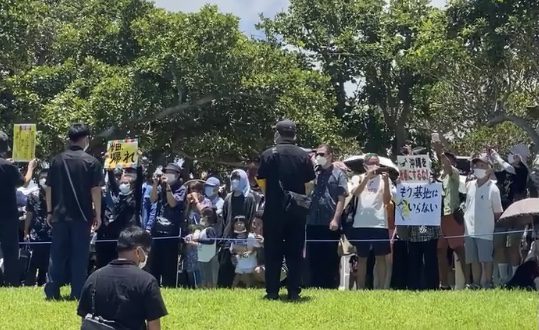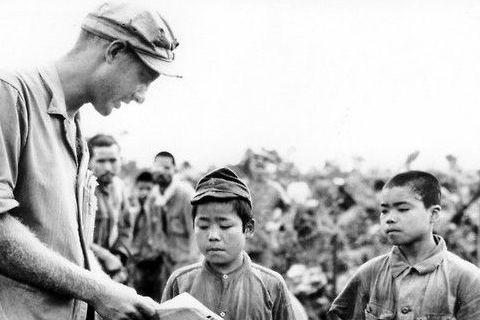Nationalist PM Kishida rebuked in Okinawa (Ryukyu): Told to go home
Kanako Mita, Sawako Utsumi, and Lee Jay Walker
Modern Tokyo Times

Prime Minister Fumio Kishida was rebuked and told to go home when he addressed people in Okinawa (Ryukyu). Kishida – attending the June 23 memorial service – was taunted to “go home” by protesters who are disillusioned by the treatment of modern-day Okinawa by political elites in Tokyo.
During the brutal war of Okinawa between Imperial Japanese forces and America, the indigenous and civilians of the former Ryukyu Kingdom (1429-1879) were mere fodder to both military forces. Similar today, during peacetime: it is all about the interests of America and Japan. Hence, the majority of the armed forces of America are stationed in Okinawa despite decades of internal discontent that is ignored and glossed over in mainland Japan.
ABC News reports, “Today, a majority of the 50,000 U.S. troops based in Japan under a bilateral security pact and 70% of U.S. military facilities are still in Okinawa, which accounts for only 0.6% of Japanese land.”
In history, the Ryukyu Kingdom (1429-1879) was a tributary of Imperial China concerning past relations before this period of history. This was further complicated when the Tokugawa Shogunate (Edo Period) enacted further power mechanisms on the Ryukyu Kingdom. However, during the Meiji Period (1868-1912), the Ryukyu Kingdom would be engulfed by Japan and lose all notion of independence.
Kishida – and other recent leaders of Japan – have continuously sidelined the people of modern-day Okinawa. Thus protesters declared that Kishida should “listen to the voices of Okinawa” – if not, then “go home.”
The Governor of Okinawa, Denny Tamaki, said last year, “I understand the necessity of the Japan-U.S. security agreement, but Okinawa shoulders such a disproportionate burden.”

Tamaki is moderate – he implies that he would be content for Okinawa to see a reduction in American bases from 70 percent to 50 percent. However, when the landmass of Okinawa is 0.6 percent, it is an indicator that for many people opposed to the military bases of America that this is insufficient and too moderate a stance.
People during the war on Okinawa were expendable to both the Americans and Japanese. Thus, turn the clock forward to 2022 and little changes. Therefore, the 0.6 percent of the landmass of Japan – and given the indigenous and cultural angle of this part of the nation – continues to be sidelined by America and Japan because it is abundantly clear that neither considers this unique area that they utilize outside of power control mechanisms and geopolitics (aimed at China).
Kishida is a nationalist (anti-China and anti-Russia) and a pro-American revisionist. He cares more about Taiwan and Ukraine than Okinawa (Ryukyu).
Kishida also seeks to preserve America’s military prowess within the body politic of Japan. Therefore, the power mechanisms of Tokyo and Washington will continue to dictate to local people for the foreseeable future – unless more potent opposition emerges.

PLEASE DONATE TO HELP MODERN TOKYO TIMES
Modern Tokyo News is part of the Modern Tokyo Times group
DONATIONS to SUPPORT MODERN TOKYO TIMES – please pay PayPal and DONATE to sawakoart@gmail.com
http://moderntokyotimes.com Modern Tokyo Times – International News and Japan News
http://sawakoart.com – Sawako Utsumi personal website and Modern Tokyo Times artist
https://moderntokyonews.com Modern Tokyo News – Tokyo News and International News
PLEASE JOIN ON TWITTER
https://twitter.com/MTT_News Modern Tokyo Times
PLEASE JOIN ON FACEBOOK
https://www.facebook.com/moderntokyotimes